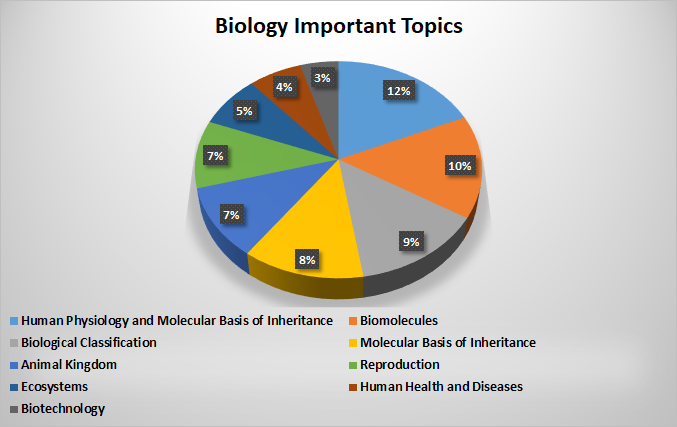Home » Posts tagged 'Important Topics'
Tag Archives: Important Topics
Important Topics for NEET 2021: Subject-wise list along with Weightage Analysis
As NEET is the only national level examination, its difficulty level is high. Hence, the aspirants should have a clear understanding of the NEET 2021 Syllabus. While preparing for the exam, keep the focus on the important topics for NEET 2021 from each section. Moreover, to get a high score in NEET 2021 exam, the students should memorize the formulae, chemical equations, and should practice the important diagrams as well.
Here you will get the important topics for NEET 2021 which you need to prepare. Therefore, to keep your name in the top position of the merit list, you should have a good grip on the high weightage chapters. Furthermore, NEET 2021 score will be used for taking admission into the AYUSH and 15% Veterinary program.
NEET aspirants should follow the best books for NEET 2021, which are recommended by the toppers of the previous years for getting high scores. Hence, you should check the best NEET 2021 preparation tips for your better understanding. All aspirants must know the most important topics for NEET 2021 and least important topics to prepare better for the exam.
Note: For NEET 2021 Preparation, students should know the NEET 2021 exam pattern in advance. NTA has also introduced some changes in the NEET 2021 exam pattern.
Check Out
NEET Chapter-Wise Weightage & Important Topics
Read the following content to find out the complete list of important topics for NEET 2021 Chemistry, Physics and Biology. The aspirants can also check the chapter-wise weightage and the difficulty level of the topics. The academic experts have classified the NEET topics as per their priority.
- Low weightage
- Medium weightage
- High weightage
Check
Physics Important Topics for NEET 2021
The aspirants have to answer 45 questions from Physics. Find the following content to understand the respective weightage of the chapters from class XI and XII NEET Physics syllabus.

| Low Weightage | Medium weightage | High Weightage |
| Units and Dimensions | Motion in one dimension | Electromagnetic Induction and Alternating current |
| Work, Energy and Power | Newton’s Laws of Motion | Ray optics |
| Thermal Properties of Matter, Calorimetry and Kinetic Theory of Gases | Circular motion | Rotational Motion |
| Photo-electric effect and electromagnetic waves | Heat Transfer | Laws of Thermodynamics |
| Nuclear Physics and Radioactivity | Properties of Matter and Fluid Mechanics | Magnetic Effects of Current |
| Center of Mass and Momentum Conservation (Collision) | Waves and sounds | Current Electricity |
| Experimental Physics | Atomic Structure in Modern Physics | Semiconductors and Communication system |
| Oscillations | Gravitation | Classical Magnetism and Magnetic Properties of Matter |
| Motion in 2 dimensions and projectile motion | Wave Optics | – |
| Electrostatics | – | – |
Check
Chapter-Wise Weightage for Physics Section
So, all the important topics along with their weightage that can come in the examination are explained below:
Physics Weightage of various NEET Topics in the previous year question papers
| Chapters & Topics | Average no. of Questions from the chapter | Weightage of the chapter and topic |
| Centre of Mass | 1 | 1% |
| Gravitation | 2 | 3% |
| Kinematics | 1 | 2% |
| Laws of Motion | 3 | 7% |
| Mechanics of Solids & Fluids | 2 | 3% |
| Oscillations | 1 | 3% |
| Units and Measurement | 1 | 2% |
| Work, Energy and power | 2 | 4% |
| Rotational motion | 1 | 1% |
| System of Particle & Rigid Body | 3 | 7% |
| Waves | 2 | 4% |
| Kinetic Theory of Gases | 1 | 2% |
| Properties of Bulk Matter | 1 | 3% |
| Thermal Properties of Matter | 1 | 2% |
| Thermodynamics | 3 | 7% |
| Magnetic Effect of Current & Magnetism | 3 | 6% |
| Electric Charge & Field | 1 | 2% |
| Electromagnetic Wave | 1 | 1% |
| Electrostatic Potential & Capacitance | 1 | 2% |
| Electrostatics | 1 | 3% |
| Current Electricity | 3 | 6% |
| Alternating Current | 1 | 3% |
| Semiconductor Electronics | 3 | 6% |
| Electromagnetic Induction | 1 | 2% |
| Atoms & Nuclei | 2 | 5% |
| Dual Nature of Radiation and Matter | 2 | 4% |
| Ray Optics & Optical Instrument | 3 | 5% |
| Wave optics | 2 | 4% |
Check
Important Topics For NEET 2021 Chemistry
NEET Chemistry section consists of 45 questions both from class XI and XII. The following table highlights the weightage of the Chemistry chapters from the Chemistry Syllabus:
| Low Weightage | Medium Weightage | High Weightage |
| Solid State | Redox Reactions and Volumetric Analysis | Chemical Bonding and Molecular Structure |
| Metallurgy: General Principles and Processes of Isolation of Metals | Carbonyl compounds (Aldehydes and Ketones) | Chemical Thermodynamics |
| Qualitative Inorganic Analysis | Classification of Elements and Periodicity in Properties | Chemical Kinetics |
| Practical and Environmental Chemistry | Mole Concept (Some basic concepts of Chemistry) | Alcohols and Ethers |
| Atomic Structure | Amines and Diazonium salts | P block elements |
| Nuclear and Surface Chemistry | Haloarenes and Phenols | General Organic Chemistry |
| Haloalkanes | Alkanes, Alkenes and Alkynes | Coordination Compounds |
| Classification and Nomenclature of Organic Compounds | Chemical Equilibrium | S block elements: Alkali and Alkaline Earth Metals and Hydrogen |
| Purification and Characterization of Organic Compounds | Ionic Equilibrium | Biomolecules and Polymers |
| Carboxylic Acid and its Derivatives | Isomerism of Organic Compounds | – |
| Liquids and Gaseous State | D and F block elements | – |
| – | Solutions and Colligative Properties | – |
| – | Electrochemistry | – |
Check Out
Chapter-Wise Weightage for Chemistry Section
Chemistry Weightage of various NEET Topics in previous year question papers
| Chapters and topics | Average no. of Questions from the chapter | Weightage of the chapter and topic |
| Organic Chemistry-I | 8% | |
| Hydrocarbons | 2 | 4% |
| General Organic Chemistry | 2 | 5% |
| Organic Chemistry-II | 26% | |
| Haloalkane | 1 | 2% |
| Aldehydes, Ketones and Carboxylic Acids | 2 | 3% |
| Polymer | 1 | 2% |
| Alkyl Halide, Alcohol & Ether | 2 | 4% |
| Aromatic Compounds | 3 | 6% |
| Biomolecules | 2 | 4% |
| Carbonyl Compounds | 2 | 4% |
| Organic Compounds containing nitrogen | 2 | 3% |
| Chemistry in Everyday Life | 2 | 3% |
| Environmental chemistry | 1 | 2% |
| IUPAC & Isomerism | 2 | 4% |
| Practical Organic Chemistry | 1 | 2% |
| Inorganic Chemistry-I | 22% | |
| Chemical Bonding | 4 | 9% |
| p-block | 3 | 7% |
| Periodic Table & Periodicity in Properties | 2 | 4% |
| Hydrogen | 1 | 2% |
| s-block | 1 | 3% |
| Inorganic Chemistry-II | 12% | |
| Coordination Compounds | 3 | 6% |
| d-block & f-block Elements | 2 | 4% |
| Metallurgy | 1 | 2% |
| Qualitative Analysis | 1 | 2% |
| Physical Chemistry-I | 17% | |
| Atomic Structure & Nuclear Chemistry | 1 | 3% |
| Chemical Equilibrium | 1 | 3% |
| Ionic Equilibrium | 2 | 4% |
| Redox Reactions | 1 | 2% |
| Gaseous State | 1 | 3% |
| Mole Concept | 2 | 5% |
| Thermodynamics and Thermochemistry | 1 | 3% |
| Physical Chemistry-II | 15% | |
| Chemical Kinetics | 2 | 4% |
| Electrochemistry | 1 | 3% |
| Solid State | 1 | 3% |
| Solution & Colligative Properties | 2 | 4% |
| Surface Chemistry | 1 | 2% |
Check
Important Topics For NEET 2021 Biology
Biology section carries the maximum weightage compared to the rest of the section. This section consists of 100 questions (both from Botany and Zoology sections), out of which 90 have to be answered. The following table highlight the respective weightages of the Biology chapters in NEET 2021 exam:

| Low Weightage | Medium Weightage | High Weightage |
| The Living World | Organisms and Population | Animal Kingdom |
| Mineral Nutrition | Neural Control and Coordination | Sexual Reproduction in Flowering Plants |
| Structural Organisation in Animals | Anatomy of Flowering Plants | Molecular Basis of Inheritance |
| Reproduction in Organisms | Digestion and Absorption | Principles of Inheritance and Variation |
| Plant Growth and Development | Evolution | Morphology of flowering plants |
| Respiration in Plants | Reproductive Health | Biological Classification |
| Strategies for enhancement in food production | Biotechnology and its Applications | – |
| Microbes in Human Welfare | Cell Cycle and Cell Division | – |
| Transport in Plants | Biodiversity and Conservation | – |
| Excretory Products and their Elimination | Biotechnology- Principles and Processes | – |
| Locomotion and Movement | Human Reproduction | – |
| Biomolecules | Breathing and Exchange of Gases | – |
| Ecosystem | Plant Kingdom | – |
| Body Fluids and Circulation | Cell- The Unit of Life | – |
| Human Health and Disease | Chemical Coordination and Integration | – |
| – | Photosynthesis in Higher Plants | – |
| – | Environmental Issues | – |
Check
Chapter-Wise Weightage for Biology Section
Biology Weightage of various NEET Topics in previous year question papers
| Biology Chapters and topics | Average no. of Questions from the chapter | Weightage of the chapter and topic |
| Zoology | ||
| Animal Diversity | 3 | 10% |
| Animal Tissue | 1 | 3% |
| Structural Organisation in animals | 1 | 2% |
| Human Physiology | 13 | 45% |
| Human Reproduction & Reproductive Health | 5 | 18% |
| Origin & Evolution | 3 | 10% |
| Animal husbandry | 1 | 3% |
| Human Health & Diseases | 3 | 9% |
| Botany | ||
| Plant Diversity | 7 | 12% |
| Plant Anatomy | 2 | 4% |
| Plant Morphology | 4 | 7% |
| Cell Biology & Cell Division | 6 | 10% |
| Bio-molecule | 2 | 3% |
| Plant Physiology | 8 | 13% |
| Plant Reproduction | 5 | 9% |
| Genetics & Biotechnology | 15 | 24% |
| Biology in Human Welfare | 1 | 2% |
| Ecology | 10 | 16% |
Check
NEET 2021 Exam Pattern
| Exam Mode | Offline |
| Exam Duration | 3 Hours |
| Total Questions | 200 |
| Total Questions to be Attempted | 180 |
| Total Marks | 720 Marks |
| No. of questions in each section | Physics- 50 Chemistry- 50 Biology- 100 (Botany- 50, Zoology- 50) |
| No. of Questions to be Attempted from Each section | Physics- 45 Chemistry- 45 Biology- 90 (Botany- 45, Zoology- 45) |
| Marking Scheme | + 4 for a correct answer,-1 for an incorrect answer |
| Type of Questions | MCQs |
| Exam Language | Hindi, English, Gujarati, Marathi, Oriya, Bengali, Assamese, Telugu, Tamil, and Kannada |
| Exam Date | 12th September 2021 |
Each question carries four marks. Four marks would be awarded for each correct response. However, one mark gets deducted for each incorrect response. Selecting more than one answer for a question led to negative marking.
Read
Detailed Paper Analysis of NEET 2020
Let us see a detailed NEET 2020 Paper analysis. Hence, the aspirants can understand what to expect in NEET 2021.
Physics:
The physics section of NEET 2020’s paper is considered as the toughest section out of the three subjects. The students had to answer direct questions that were solely based on the formulas. Compared to NEET 2019, it was slightly tougher and lengthier. Total 22 questions in Physics came from class 11th and class 12th respectively. The following table represents the number of Physics questions, which were asked mostly to the aspirants.
| Name of Chapters | Number of Questions |
| Mechanics | 16 |
| Heat and Thermodynamics | 5 |
| Electrostatics and Magnetism | 5 |
| Optics and Modern Physics | 10 |
| Current Electricity | 9 |
Chemistry:
For NEET 2020, the chemistry questions were difficult, reason being lengthy calculations. Many questions were theoretical and they were a little difficult to solve. The paper had 15 questions from Organic, Inorganic and Physical Chemistry each. Go through the following content to understand the number of questions that have come from each of the high weightage chapters of Chemistry.
| Name of the chapters | Number of questions |
| Organic | 15 |
| Inorganic | 15 |
| Physical | 15 |
Biology:
The NEET 2020 paper was easy to solve but some of the questions were tricky. Most of the questions were straight from the NCERT syllabus. For instance, mostly asked questions from the respective Biology chapters in the past years have been highlighted in the following tabulated format:
| Name of the chapters | Number of questions |
| Biology in Human Welfare | 3 |
| Ecology | 11 |
| Plant Physiology | 7 |
| Human Physiology | 15 |
| Cell Structure | 6 |
| Structural organization in animal and plant | 7 |
| Biotechnology | 8 |
| Diversity of Living Organism | 12 |
| reproduction | 10 |
| Genetic and Evolution | 11 |
Check Out
Effective Preparation Strategy for the Exam
Have focus
First, if you are preparing for NEET, you should take mental preparation for it. NEET examination preparation is quite difficult. You need to maintain a positive approach towards your goal. With the recent high levels of competition, students get easily disheartened and start doubting themselves.
It is important to just focus on your NEET 2021 Preparation and to believe in yourself. Due to the intensity of the preparation, it is very important to be ready to put in all the mental and physical effort. Hence, the students can clear the exam.
Stay on the syllabus
You should know all the topics in the syllabus for the exam. For this, you should check the syllabus at regular intervals, and then collect the study material for preparation. This will also ensure that you do not deviate from the topic at hand and study irrelevant material. Reference to best books for NEET 2021 preparation and previous years NEET question papers will go a long way into your preparations.
Time Management
Following a strict timetable as per specific syllabus and targets is very important if you want to complete the syllabus on time and also leave an ample amount of time for revision. Making notes of topics while preparing them would cut a lot of time during. You would thus solve more and more problems to discover more and more new tricks. Try to give more time to the most important topics for NEET 2021 that you feel are your weak points. This will help you to perform well in the exam
Study with a group
Working with a competitive study group helps you successfully prepare for NEET. Group discussion creates a cooperative environment, helping you to multiply your knowledge exponentially, while also being a great way to have social interaction. Students can solve quizzes and challenge each other with questions from the NEET 2021 syllabus.
It should also be pointed out that study groups should be made with people who want to study. Make sure none of the people invited are a cause for distractions. Often one amongst the group will bring up irrelevant topics and cause everyone else to lose focus in their studies.
Take Mock Tests
One great way to assess your skills and knowledge is through mock tests. You should start taking the mock test after you have completed all the topics and subjects. Ideally, taking a mock test a month before the exam makes more sense. That is because taking a mock test is there for practice and not for studying. Students can start taking the mock test before one month of the exam and two in a week will be a good number.
Previous year question papers
One of the most important tips and things to do when preparing for NEET exam is to solve previous years NEET question papers. It helps students to understand the exam pattern. In addition, the aspirants can identify the type of questions asked, syllabus and of course the complexity level of the questions being asked in the NEET exam.
On the other hand, solving previous year question papers leads to enhanced speed, accuracy levels of the students. Consequently, they can implement a strategy to attempt the question paper. This can help them attempt a full question paper when taking the actual exam.
Revision after studies
Covering new topics without revising the already covered ones will be a waste of time. Without consistent revision, the students forget the concepts they covered in the past. Moreover, the students will spend more time learning chapters or topics. NEET 2021 revision will also help you in increasing your test-taking speed and overcoming panic. It will also give you a clear picture of the topics you’re weak in. For better understanding read NEET 2021 Revision Plan.
Avoid beginning new topics near the exam date
If you are following this article, you know you should have a schedule for time management. Make sure to complete all your study topics a few weeks before the NEET 2021. Please ensure that you keep the last two weeks only for the revision and for taking mock tests. Beginning new topics a few days before the examination wouldn’t help you. Instead, you will start to panic.
Avoid destructive elements
Distractions are to be avoided during NEET 2021 preparation days, especially when the exam is near. Therefore, spend less time on social media interactions like Facebook, WhatsApp etc. However, recently many social media groups have started offering some important exam tips. If you do plan on spending time on social media, you can check out such groups too.
Pay attention to your health
Don’t over push for studies, ensure you take rest and exercise regularly. Too many sleepless nights and improper food will take a toll on your health. Having a good diet is as essential as studying. Your brain needs regular energy and rest to work and function efficiently. You must ensure that you get at least 8 hours of sleep every day. Apart from that, you also need to ensure a proper balanced diet. As the saying goes, “A healthy mind resides in a healthy body.”
It is only with practice that you gain confidence over topics that are asked in NEET. Practice can be done through Sticking to the syllabus and practicing NCERT books is the pro-tip to get a high score in NEET 2021.
Read
Hopefully, this article helped you with your queries about the NEET 2021 exam, and how to prepare for it. Keep these strategies in mind while studying, and also keep the syllabus for the NEET exam close by.
All the best!
1. Can I leave the Chemistry section during preparation for NEET 2021?
Answer: It is advisable to not leave any section during the preparation for NEET 2021. The Chemistry section carries 180 marks so it would be very difficult to clear the exam if you leave this section fully.
Is it possible to crack NEET 2021 if I start my preparation now?
Answer: Though the syllabus for NEET 2021 is vast and requires a thorough understanding, you can crack NEET if you devote maximum hours to studies and work hard to achieve results.
Can I get admission to AIIMS through NEET score?
Answer: Yes, AIIMS also offers admission on the basis of NEET score.
Is it important to study NCERT for NEET?
Answer: Yes, almost half of the questions are asked from NCERT textbooks thus students must study NCERT textbooks thoroughly.






